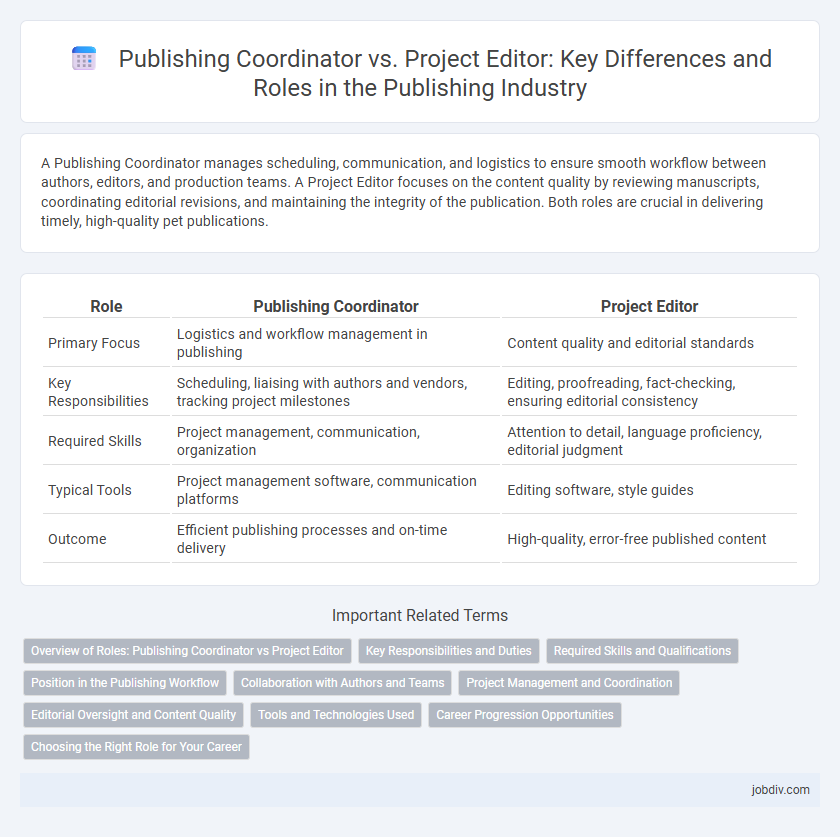A Publishing Coordinator manages scheduling, communication, and logistics to ensure smooth workflow between authors, editors, and production teams. A Project Editor focuses on the content quality by reviewing manuscripts, coordinating editorial revisions, and maintaining the integrity of the publication. Both roles are crucial in delivering timely, high-quality pet publications.
Table of Comparison
| Role | Publishing Coordinator | Project Editor |
|---|---|---|
| Primary Focus | Logistics and workflow management in publishing | Content quality and editorial standards |
| Key Responsibilities | Scheduling, liaising with authors and vendors, tracking project milestones | Editing, proofreading, fact-checking, ensuring editorial consistency |
| Required Skills | Project management, communication, organization | Attention to detail, language proficiency, editorial judgment |
| Typical Tools | Project management software, communication platforms | Editing software, style guides |
| Outcome | Efficient publishing processes and on-time delivery | High-quality, error-free published content |
Overview of Roles: Publishing Coordinator vs Project Editor
Publishing Coordinators manage the logistical and administrative tasks essential for smooth production workflows, including scheduling, communication between departments, and tracking project timelines. Project Editors oversee the editorial content quality, ensuring manuscripts meet publication standards through editing, proofreading, and coordinating with authors for revisions. Both roles collaborate closely to guarantee efficient publication processes, balancing operational management with content integrity.
Key Responsibilities and Duties
A Publishing Coordinator manages the logistical aspects of book production, including scheduling, communication with authors, and coordinating between editorial, design, and marketing teams to ensure timely publication. In contrast, a Project Editor focuses on the content development process, overseeing manuscript editing, maintaining editorial standards, and collaborating closely with authors to refine the text. Both roles require strong organizational skills, but the Publishing Coordinator emphasizes operational management, while the Project Editor centers on content quality and editorial accuracy.
Required Skills and Qualifications
Publishing Coordinators require strong organizational skills, proficiency in project management software, and effective communication abilities to oversee production schedules and coordinate between departments. Project Editors need advanced editorial expertise, including content evaluation, copyediting, and adherence to style guides, coupled with a keen eye for detail and critical thinking. Both roles benefit from knowledge of the publishing industry, but coordinators emphasize logistics and timelines, while editors focus on content accuracy and quality control.
Position in the Publishing Workflow
A Publishing Coordinator manages the overall production schedule, coordinating between authors, editors, designers, and printers to ensure timely delivery of manuscripts. A Project Editor focuses on the editorial aspects, overseeing content development, manuscript editing, and quality control during the publishing process. The Publishing Coordinator operates at the logistical level, while the Project Editor specializes in content refinement within the publishing workflow.
Collaboration with Authors and Teams
Publishing coordinators facilitate seamless communication between authors and production teams, ensuring manuscripts meet deadlines and standards. Project editors work closely with authors to refine content, providing detailed feedback and managing editorial workflows for quality assurance. Both roles collaborate intensively to balance creative input with logistical execution in the publishing process.
Project Management and Coordination
A Publishing Coordinator primarily manages scheduling, communication, and logistics to ensure smooth workflow across departments, while a Project Editor focuses on overseeing the editorial process, manuscript development, and quality control. Both roles require strong project management skills, but the Project Editor integrates content expertise with coordination to align editorial objectives and timelines. Effective collaboration between these positions enhances publication efficiency and adherence to deadlines in the publishing industry.
Editorial Oversight and Content Quality
A Publishing Coordinator manages the workflow and scheduling to ensure timely production, emphasizing team coordination without deeply engaging in content evaluation. In contrast, a Project Editor provides direct editorial oversight, focusing on content quality, accuracy, and consistency throughout the publishing process. Their role involves detailed manuscript review, author collaboration, and adherence to editorial standards to enhance the final publication.
Tools and Technologies Used
Publishing Coordinators primarily use project management tools like Asana, Trello, and Microsoft Project to oversee editorial schedules, communications, and workflow tracking. Project Editors utilize advanced editing software such as Adobe InDesign, Final Draft, and content management systems (CMS) like WordPress or Drupal for manuscript editing, formatting, and digital publishing. Both roles rely on collaboration platforms like Slack and Google Workspace to streamline team communication and document sharing.
Career Progression Opportunities
Publishing Coordinators often gain foundational experience in managing editorial workflows and client communications, serving as a stepping stone to more specialized roles. Project Editors advance by overseeing complex editorial projects, refining content quality, and coordinating with multiple departments, positioning themselves for senior editorial or management roles. Career progression typically moves from Publishing Coordinator to Project Editor, then to Senior Editor or Editorial Manager, with opportunities to lead larger teams and strategic initiatives.
Choosing the Right Role for Your Career
A Publishing Coordinator manages workflow, schedules, and communication between departments to ensure timely project completion, making it ideal for professionals skilled in organization and multitasking. A Project Editor focuses on content quality, editing manuscripts, and collaborating closely with authors, suited for those with strong editorial expertise and attention to detail. Understanding these distinct responsibilities helps publishing professionals align their career goals with the role that best fits their strengths and interests.
Publishing Coordinator vs Project Editor Infographic

 jobdiv.com
jobdiv.com